Key takeaways
- Understanding fundamentals like data types, control structures, and memory management in C++ is crucial for effective programming.
- Project-based learning enhances engagement and helps solidify concepts through practical experience and problem-solving.
- Choosing appropriate projects that match one’s skill level and interests fosters confidence and motivation in learning.
- Effective planning of projects and embracing errors as learning opportunities are essential for developing coding skills and perseverance.
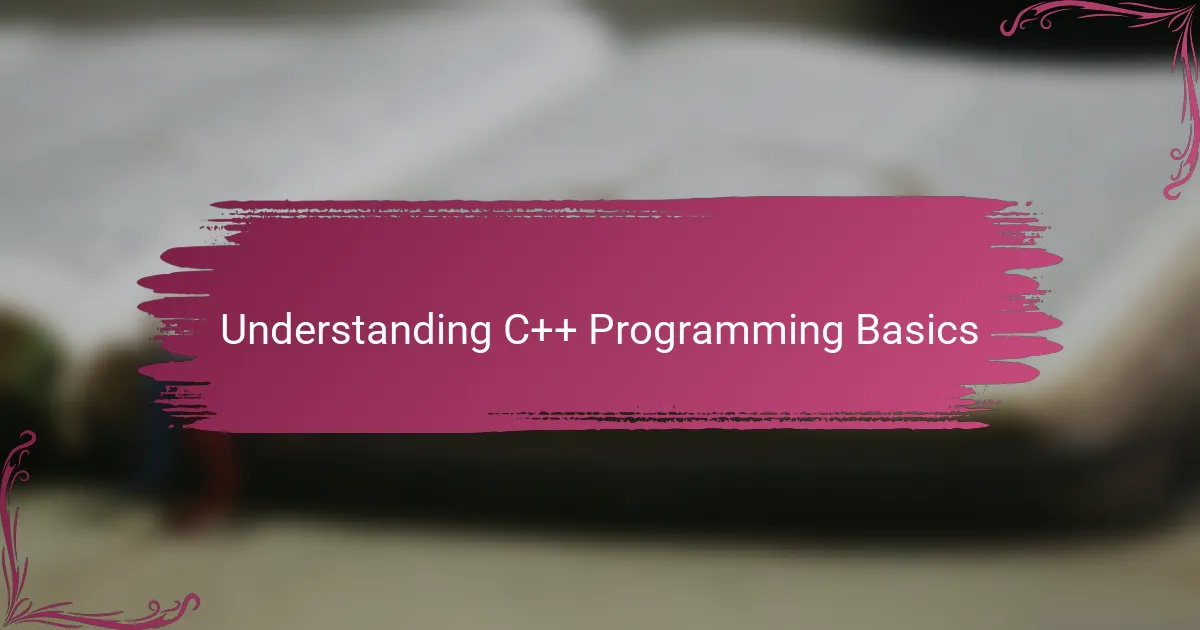
Understanding C++ Programming Basics
Getting a solid grasp of C++ basics was a game-changer in my learning journey. I remember grappling with variables and data types at first—questions like “What exactly is an integer versus a float?” kept popping up. But breaking these concepts down through small, hands-on examples made everything click.
One thing that really stuck with me was understanding control structures, like loops and conditionals. They aren’t just abstract ideas; they’re the tools that let your program make decisions and repeat tasks, which feels almost like teaching a computer to think step-by-step. It made me appreciate just how powerful and flexible C++ can be, even at this foundational level.
Have you ever paused to think about how memory management works in C++? Concepts like pointers initially seemed intimidating and even a bit scary. But once I started experimenting with them in projects, I realized they gave me precise control over how data is handled—something you don’t get in many other languages. This insight made me feel more confident and in control as I progressed.
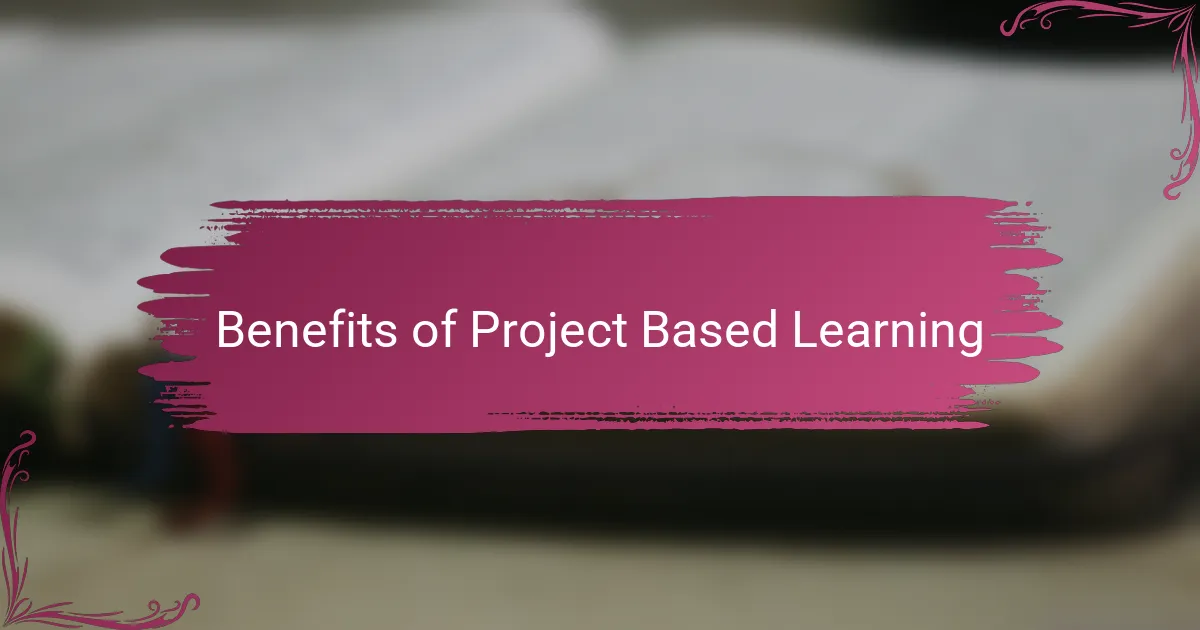
Benefits of Project Based Learning
Diving into projects made all the difference for me because it transformed abstract syntax into something tangible. When I built even a simple calculator, I wasn’t just memorizing commands—I was solving real problems. Have you ever noticed how tackling a concrete task makes learning stick better? That’s the magic of project-based learning.
What I loved most was how these projects forced me to think like a programmer, not just a student. Debugging my code during a small game project was frustrating at times, but it pushed me to understand the language’s quirks deeply. Each bug felt like a puzzle, and solving it built my confidence far more than any textbook exercise could.
Project-based learning also gave me a sense of accomplishment that kept me motivated. Finishing a program that actually worked was a rewarding moment, making all the earlier confusion fade away. It’s that emotional payoff, I believe, that fuels consistent progress when learning something as complex as C++.
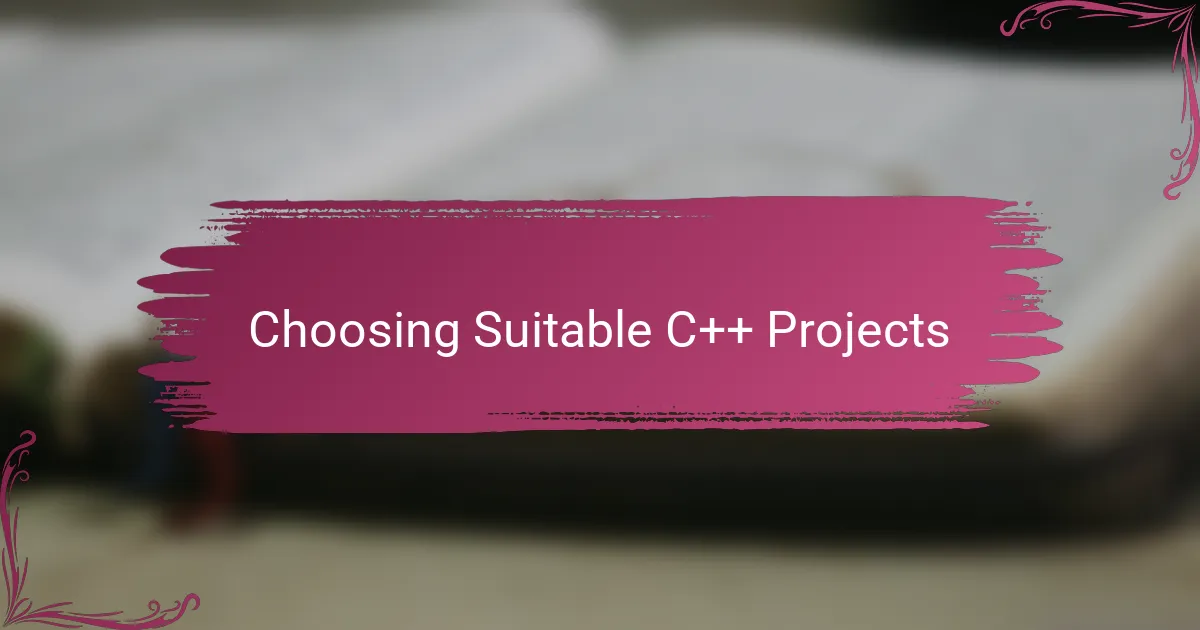
Choosing Suitable C++ Projects
Picking the right C++ projects can really shape how effectively you learn. I found that starting with something too complicated was overwhelming and killed my motivation fast. For instance, when I first tried to build a full-fledged game, I got lost in details instead of learning core concepts.
It helped me more to choose projects that matched my current skill level but still challenged me just enough. Simple programs like a text-based menu or a basic file handler were perfect stepping stones. Have you ever noticed how small wins boost your confidence and keep you going? That’s exactly what happened to me.
Also, I realized picking projects aligned with my interests made a huge difference. When I worked on a project simulating a personal finance tracker, my excitement turned into productive learning sessions. It’s easier to stick with something that feels meaningful rather than just a random exercise. What projects do you think would keep you this engaged?
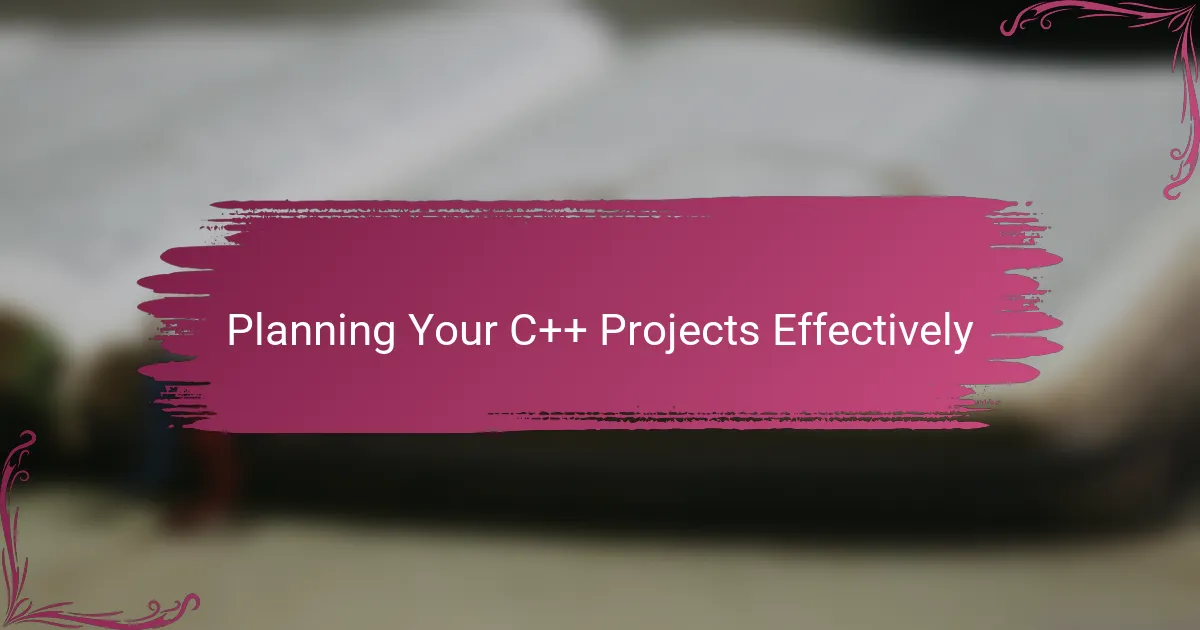
Planning Your C++ Projects Effectively
Planning your C++ projects effectively was a skill I had to develop early on. I used to dive straight into coding without much thought, only to get stuck halfway through because I hadn’t thought through the structure or goals clearly. It taught me that laying out a roadmap beforehand saves so much frustration later.
One practice that really helped was breaking down the project into smaller, manageable tasks. For example, when I worked on a simple file organizer, I first outlined what functions I needed—reading files, sorting them, and displaying results. This step-by-step approach kept me focused and made progress feel achievable, rather than overwhelming.
Have you tried sketching your project flow or writing pseudocode before jumping in? I found this makes the abstract code feel more concrete. Plus, it gives a sense of direction that mirrors real-world software development, which is incredibly motivating. Planning isn’t just about efficiency; it builds confidence as you see a clear path forward.
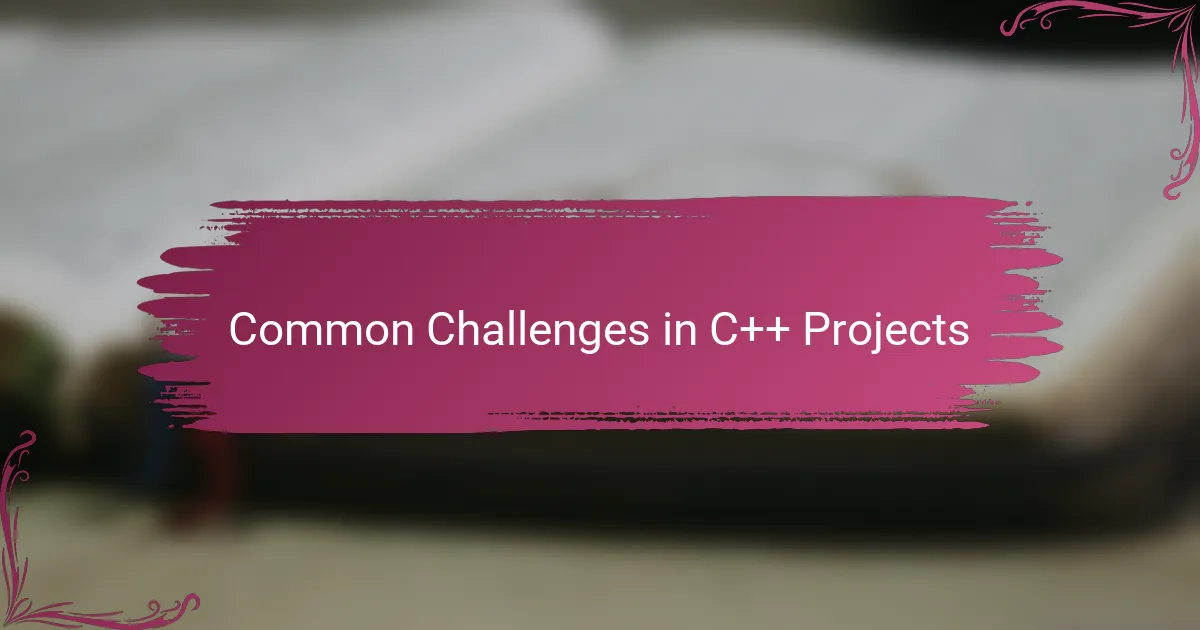
Common Challenges in C++ Projects
One thing I often stumbled over was managing C++’s syntax quirks. Semicolons in the wrong place, missing braces, or confusing the scope of variables would throw errors that sometimes felt cryptic. Have you ever spent way too long just hunting down a tiny typo? It’s frustrating, but I learned that patience and careful reading of compiler messages are lifesavers.
Memory management was another tricky beast. Unlike some other languages, C++ hands you the reins with pointers and manual allocation, which means one wrong move can crash your program or create subtle bugs. I remember debugging a segmentation fault for hours—turns out, I had dereferenced a null pointer. Those moments taught me the importance of being meticulous with resource handling.
Then there’s the challenge of linking external libraries and dependencies, which can be a headache for beginners. I once lost a whole afternoon simply because the compiler couldn’t find a required header file due to a misconfigured path. Have you experienced that after a long coding session? It’s a humbling reminder that setting up your environment correctly is just as critical as writing the code itself.
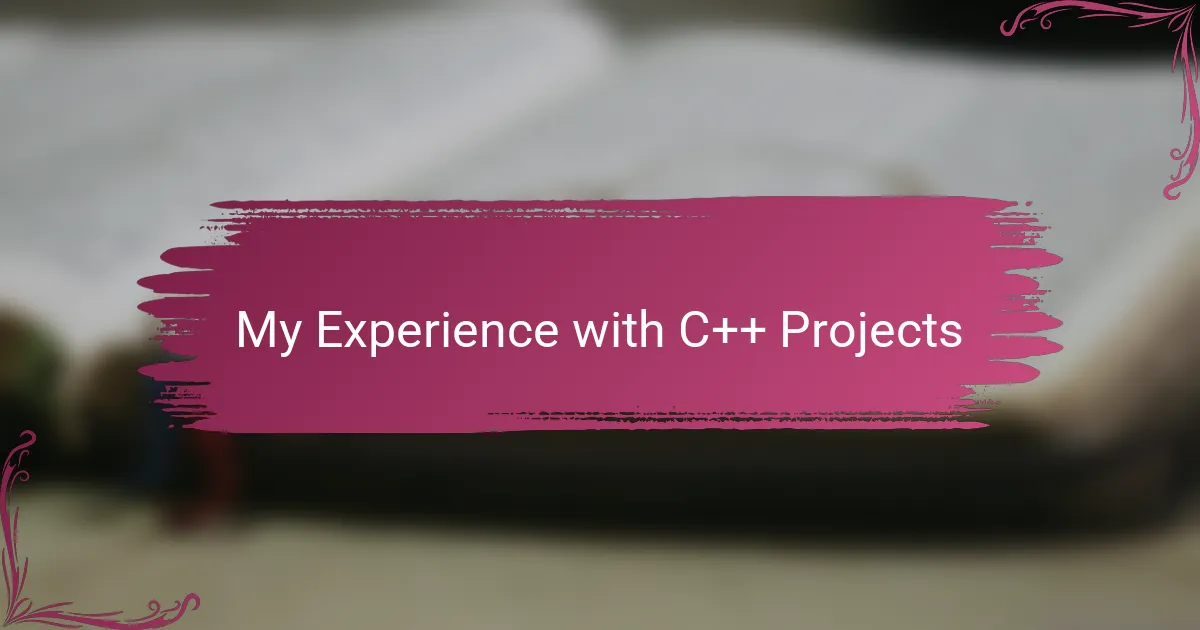
My Experience with C++ Projects
Working on C++ projects was where theory truly met reality for me. I recall my first attempt at creating a simple console-based game; the excitement was intense, but so was the frustration when bugs popped up at every turn. Have you ever felt that mix of thrill and annoyance? For me, those moments were essential—they forced me to dig into the language’s intricacies and made success that much sweeter.
One project that stands out in my memory involved building a small text editor. At first, the idea of managing file input and output felt overwhelming, but breaking the project into smaller pieces helped me stay sane. I learned firsthand how rewarding it is to see incremental progress, like getting basic file saving to work before adding features like text formatting.
What I appreciate most about working on C++ projects is how they pushed me to develop patience and attention to detail. C++ doesn’t forgive careless mistakes easily, so every project became a lesson in careful coding and thoughtful debugging. It’s challenging but incredibly satisfying when everything finally clicks into place.
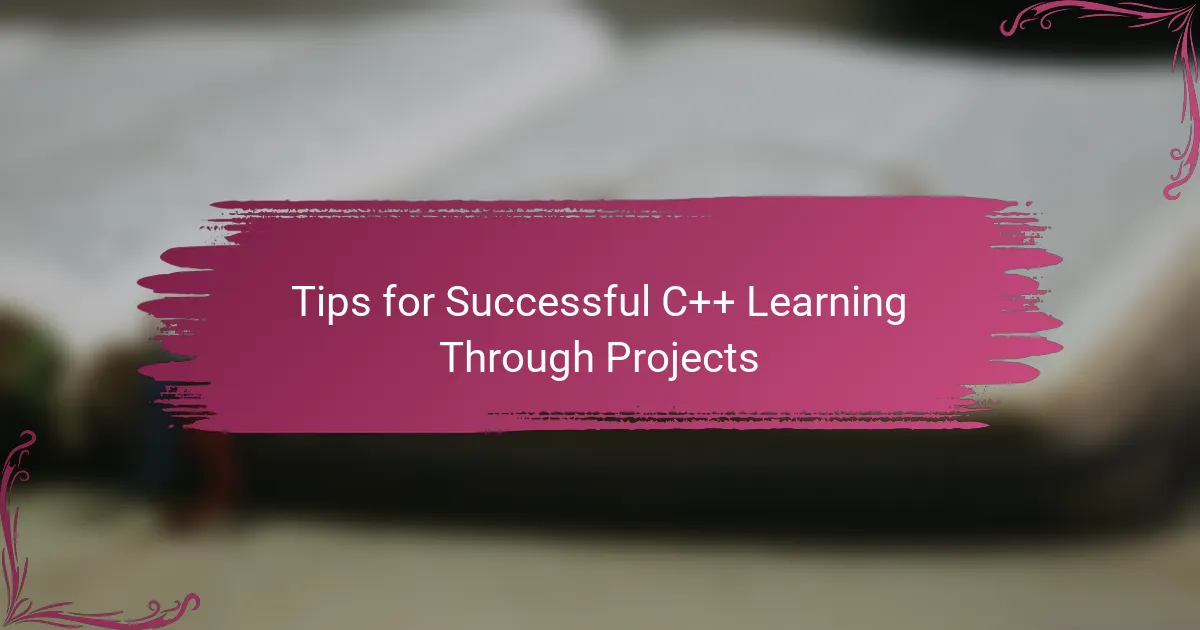
Tips for Successful C++ Learning Through Projects
One tip I always stress is to start small and build incrementally. When I rushed into complex projects too soon, I felt overwhelmed and demotivated. Have you ever tried coding a massive project from scratch only to get stuck and frustrated? Breaking it down into manageable chunks keeps the process enjoyable and your confidence growing.
Another piece of advice is to embrace mistakes as part of the journey. Early on, I wasted hours hunting elusive bugs, feeling stuck and discouraged. But each bug taught me something new about C++’s quirks and deeper mechanics. Instead of fearing errors, I learned to see them as puzzles that sharpened my problem-solving skills.
Lastly, don’t underestimate the power of sharing your projects and getting feedback. I found that discussing my code with others, whether peers or online communities, opened my eyes to cleaner solutions and best practices. Have you shared your work and felt that boost of motivation when someone appreciates your effort or offers helpful tips? It’s an invaluable part of successful learning through projects.